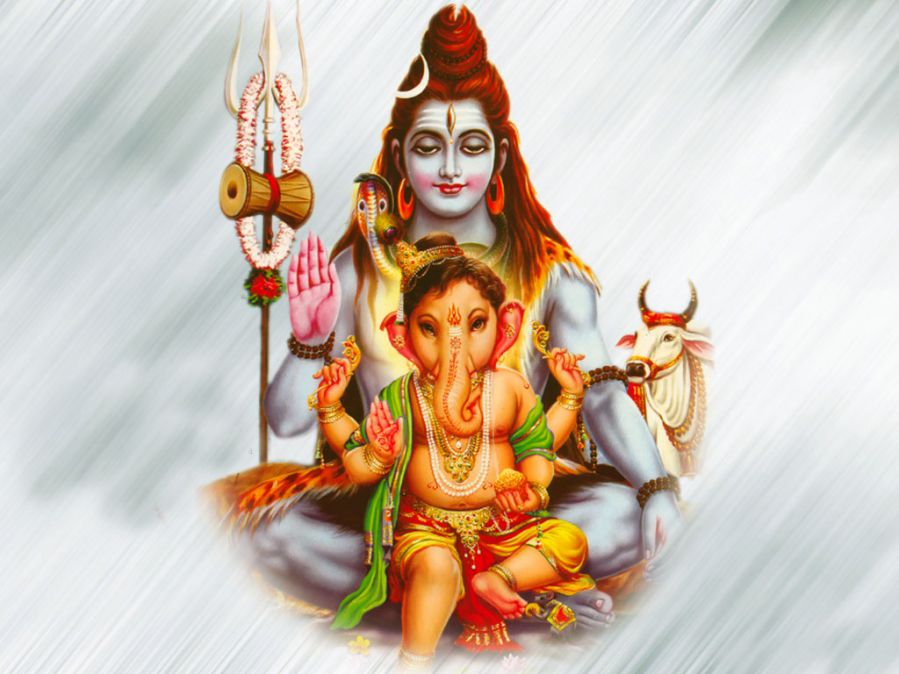No products in the cart.
Widely revered as the remover of obstacles, the patron of arts and sciences and the ‘Deva’ of intellect and wisdom, Lord Ganesha (also known as Ganapati and Vinayaka) is one of the best-known and most worshipped deities in the Hindu religion. As the God of beginnings, he is worshipped first, at the start of rituals and ceremonies in Hinduism. Ganesha is the son of Shiva and Parvati.
Devotees of Lord Ganesha believe that if He is propitiated, He grants success, prosperity and protection against adversity. Therefore, He is worshipped on almost every religious and secular occasion and is especially invoked at the beginning of prayers, important undertakings, and before any new venture.
The story behind worshipping Lord Ganesha at beginning is :
Shiva Bhagwan left his abode on Mt. Kailas in the Himalayas to meditate in a cave. Parvati’s friends suggested that She should have an attendant (gana) of her own because they were not pleased with Shiva’s ganas.
Thus, She used her divine powers and bore a son. She named him Vinayak and instructed him to guard their home.
When Shiva returned home, Vinayak did not allow Him to enter. After a brief argument, Shiva beheaded Vinayak with his trishul. When Parvati heard about this incident, She cried in despair over the loss of her son. To console Parvati, Shiva sent His men to the forest and instructed them to retrieve the head of the first living creature they would see that would be sleeping with its head towards North direction. They had to search long and hard, and finally they found a baby elephant sleeping with its head towards North direction.
Hence, shortly after, Shiva’s men returned with the head of the baby elephant. With His divine powers, Shiva placed the baby elephant’s head over His son’s body. In a matter of seconds, Vinayak came back to life.
After this incident, Vinayak became known as Gajaanan, which stems from the root word ‘gaj’ meaning elephant.
Shiva blessed Him with a boon and explained that people would first offer their love and devotion to Ganeshji before starting any auspicious activity.
The Shiva Mahapurana, Rudra Samhita (Kumara Khanda), Chapter 18 states further that Goddess Parvati adored him and declared that he will be worshipped first.
पूजयित्वा सुतं देवी मुखमाचुम्ब्य शाङ्करी।
वरान्ददौ तदा प्रीत्या जातस्त्वं दु:खितोऽधुना॥७॥
Then adoring her son, the goddess Girija, kissed his face, bestowing him with several boons. Then she said, “You had to suffer much,
धन्योऽसि कृतकृत्योऽसि पूर्वपूज्यो भवाधुना।
सर्वेषाममराणां वै सर्वदा दुःखवर्जितः॥८॥
You are quite graceful. You are successful in all your missions. You would be adored first of all the gods and those who would do so would always remain comfortable. Lord Vishnu and Lord Brahma also declared the same.
अहं च शङ्करश्चैव विष्णुश्चैते त्रयः सुराः।
प्रत्यूचुर्गुगपतप्रीत्या ददतौ वरमुक्तमम्॥२०॥
Then I myself, besides Shiva and Vishnu, bestowed on him the best of boons, and Said to him collectively.
त्रयो वयं सुरवरा यथा पूज्या जगत्रये।
तथाऽयं गणनाथश्च सकलैः प्रतिपूज्यताम्॥ २१॥
As we three are considered to be the best and most adorable among the gods, similarly, the leader of the ganas i.e. Gaņeśa would be adored in future.
वयंच प्राकृताश्चायं प्राकृतः पूज्य एव च।
गणेशो विध्नहर्ता हि सर्वकामफलप्रद:। २२॥
Ganesa is the remover of the obstructions and bestows rewards of all the desires.
एतत्पूजां पुरा कृत्वा पश्चात्पूज्या वयं नरैः।
वयं च पूजिताः सर्वे नायं च पूजितो यदा॥ २३॥
अस्मिन्नपूजिते देवा परपूजा कृता यदि।
तदा तत्फलहानिः स्यान्नात्र कार्या विचारणा॥ २४॥
इत्युक्त्वा स गणेशानो नानावस्तुभिरादरात्।
शिवेन पूजितः पूर्वं विष्णुनाऽनुप्रपूजितः॥ २५॥
He would be adored first and then the people would adore us. In case the people adoring us and would not adore Ganesa, their adoration would be infructuous. There is no doubt about it. Brahma said, “Thus speaking, initially, Siva adored Ganesa, offering many things. Thereafter Visnu adored him.
ब्रह्मणा च मया तत्र पार्वत्या च प्रपूजितः।
सर्वैर्देवगणैश्चैव पूजितः परया मुदा।। २६॥
Then I (Brahma) together with Parvati and other gods, adored him with utmost devotion.






